Flags of Our Fathers (2006)
Dir. Clint Eastwood
Writ. Paul Haggis; James Bradley, novel
w/ Ryan Phillippe, Jesse Bradford, Adam Beach, Barry Pepper
In a breath-taking reinvention of the war film, Clint Eastwood’s Flags of Our Fathers depicts the less visible elements behind war through the experiences of three seeming heroes. Ryan Phillipe, Jesse Bradford, and Adam Beach re-enact the masquerade three soldiers are asked to perform after a prematurely victorious claiming of Iwo Jima ends with bloodshed. The snapshot of the event is sent back to the States for mass production where it becomes iconic overnight, spawning a false sense of closure. The shift in public perception as a result of the now-famous image tells the story of a war that bankrupted the treasury, forced the FDR administration to inflate the economy with freshly minted money, and brought three soldiers home to sell war bonds vis-à-vis their new glory.
Half-truths are the stuff of wars and Flags breaks no knuckles to dissemble that fact. The lies revolving around the three soldiers’ tour bear the burden of the story’s larger context, the reflection of war’s presumptive deceit. Emotions brought to heel by the scope of what each soldier has been through acts as the focal point for the film’s inter-cutting between the trenches of Iwo Jima and the anti-climactic stadium tours for the American public. Embodying the more frenetic emotions is Beach as the real-life Native American soldier Ira Hayes, who had wanted to stay on the front but gets shipped home for the war effort instead. Getting drunk night after night, Hayes spills their general reception to the horrors of public ignorance as much as, if not more than, the horrors of war.
And horror, precisely, informs Eastwood’s landscape, not action. By taking the verbal subtext of the standard war film format out, and replacing it with a suspenseful sense of the macabre, he has isolated war as singular acts and experiences with repercussions on a personal level that may not have been visually discussed before Flags. Soldiers crouch in pockets separated from their fellows with darkness, smoke, and distance. Guns emerge from Japanese turrets with painstaking separation from their unseen operators whose aim is uncertain but a sure and calculated defense against an overwhelming invading force.
That Eastwood never stoops to overwhelm with sheer numbers in battle, nor with epic CGI landscapes, credits the director’s intent and casts a quiet, new light on an already impressive and understated filmography. That’s not to say that Flags doesn’t employ effects where needed, nor that they aren’t magnificent when applied; but the focus remains on the inner turmoil and its translation to the audience member as a participant in a war that pulled attention in so many directions, in part to avoid facing the grim truth and the grimmer realities of World War II. America and the world have seen the bloody combat scenes time and time again in war films. Eastwood lays those impulses aside to set the tone and the space to go someplace new, unexplored, and ultimately languageless.
That undiscovered country will emerge of course in his follow-up segment, Letters from Iwo Jima, which will appear early next year from the Japanese viewpoint. A decidedly good and fresh idea, the echoes of the first installment should still be sounding softly by that time, a reminder that a new outlook on an old and still unresolved problem always exists in the eyes of the searching. My gut tells me that Letters should bring that home.
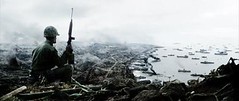

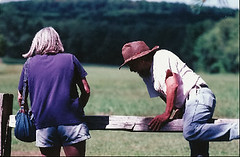
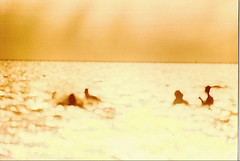
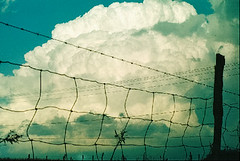
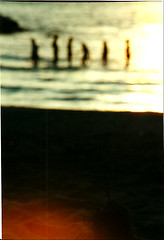
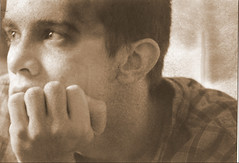
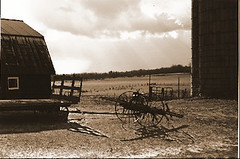
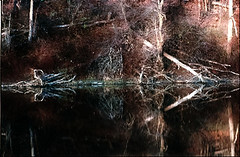






3 Comments:
Beautiful film critique. I feel like such a boob after reading your verbal dissection and commentary. I liked "Flags of Our Fathers." But you see? My response to a movie is often either "I really liked it," or a pinch to the nose.
That can be understandable, although considering how much effort and suffering it often takes to make a film, I'd recommend not pinching the nose too much, unless it really deserves it... ;)
Don't feel like a boob, btw. I've been writing since I was 6...so, about 25 years.
That's a lifetime to some!
Before starting my review, let me just explain how Clint Eastwood is and will always be one of the greatest icons in cinema. He is cool. He is so cool to the point of directing a mega-production after a small, intimate film. He is so cool that he beats John Wayne in the ''Western Idol'' competition. That said, let's go on to his mega-production I've mentioned, a WWII drama named ''Flags of our Fathers''.
After proving he can be, besides a spectacular actor, an spectacular director (with Mystic River, Million Dollar Baby, and his masterpiece, The Unforgiven, all of which in the Top 250), Clint leads us back in time and teaches us some history about Iwo Jima. After a gruesome and heroic battle, six men lift up a flag and a picture is taken. That picture becomes a treasure, and the war heroes returning to their homes, the same men that carried that flag, become myths.
The story is mainly about three characters: the honest and sensitive John ''Doc'' Bradley (Ryan Phillipe), who believes taking full credit for the battle because of one picture is wrong, the brave soldier Rene Gagnon (Jesse Bradford), who is willing to prove he is a hero, even though he tries not to get in a real battle, and the naive, but strong Ira Hayes (Adam Beach, in a role that may probably gather him a Supporting Actor nod). The whole film is entirely narrated by John Bradley (at this time, in old age, played by Len Cariou). As the film tells us, these are the only ones in the picture that manage to come out of war alive.
The film revolves around this picture, and also about how these three men live after the war. Ira is target of racism, Bradley is haunted by memories of war and his friends who past away (in special Iggy, played by Jamie Bell, whom Bradley was fond of before his death), and Gagnon celebrates all the media attention.
The film, however, is greatly flawed. And that hurts a lot for me to say this, considering the appreciation I have for Eastwood. He turns a movie worthy of a gargantuan epic drama into an opportunistic drama, with situations entirely designed to make audiences cry. In the battle scenes, Eastwood is a lion: perfectly orchestrated, they're the high point of this (overlong) picture. However, in the drama, Clint loses his heels. It gets kind of sad, seeing all these clichéd moments.
Eastwood still proves to be a great director for actors. He takes out great performances of the cast, with three in particular. Adam Beach, perfect as Ira Hayes. Barry Pepper, magnificent as another flag-raiser, Michael Strank, which was a leader for his men. And Robert Patrick, as the Colonel Chandler. There are still thousands of roles in the movie, and they all deserve some praise.
In conclusion, Eastwood seems to run head over heels in this war picture. However, it is almost undeniable the potential this movie has for the Oscars. It is technically perfect, no doubt about it. It is beautifully directed, of course. But it is melodramatic, and it is the same war story you've seen a thousand times told again. The only difference is the power of the story teller.---6/10
P.S: This movie is probable to gain an Oscar nod for Best Picture. But, as the review lends to show, it is not my favorite. Starting from today, my cheering goes to the magnificent, gripping, A+ gangster drama, ''The Departed''. Scorcese X Eastwood, once again.
Buy Discount DVD Movies, Cheap DVDs, Buy DVDs Online
Post a Comment
<< Home